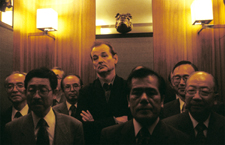It’s been a long time since Bill Murray has been in a movie worth mentioning.
His brief stint in movies done by the Farrelly brothers had many wondering if the one-time comic genius had lost his touch.
However, his new film, “Lost in Translation,” shows that he hasn’t.
Murray plays Bob Harris, a washed-up action movie hero who has been sent to Tokyo to shoot a series of commercials.
While there, he meets Charlotte (Scarlett Johansson), who has accompanied her negligent photographer husband to Japan, even though she’s in the middle of a mid-life crisis — at the age of 22.
The two meet by accident and strike up an unlikely friendship that involves karaoke, self-help tapes and sushi.
The two learn from one another as Charlotte prepares to truly begin her life, and Bob quickly passes middle age.
Both impart some much-needed wisdom and youth to one another, which is good, since for the most, part they are completely clueless.
If that plot summary seems skimpy, it is.
“Lost in Translation” is light on the plot, heavy on the scenery.
The movie’s primary areas of focus are the visual and audio components.
Watching this movie is like sitting still while the entire contents of an art museum are rolled out before you.
So if you like your movies to have a lot of action or plot, this is a movie that will easily bore you half way through.
If nothing else, this movie proves that Sofia Coppola’s talents lie in directing, not acting. Her direction is superb.
The important shots are loaded with hidden meaning and beauty, making the audience members feel like they’re in the movie, not watching it.
Everything from the glittering sight of downtown Tokyo at night to the peaceful world of a monastery garden is shot with expertise.
The music ranges all over the charts.
Opening and closing with two distinctive styles, “Lost in Translation’s” soundtrack is like flipping radio stations.
But rather than detract from the continuity of the film, it adds to it.
The movie tackles serious issues, but there is an undeniable humor throughout.
Though Murray himself isn’t considered tall, his towering over the Japanese is a joke that runs through the whole film.
Most of the humor is ironic — you have to think to truly understand it.
But the subtle jokes are often the most powerful, especially in this film.
The best thing about this movie is the ending. In a movie like this, the ending either makes or breaks the movie.
This movie in particular could have had a hundred different endings.
Fortunately, Coppola chose the perfect one. She leaves the viewers contemplating what true meaning of the movie was and wishing they could lip-read.

Bill Murray stars in ´Lost in Translation.´ (Photo Courtesy of Focus Features)







